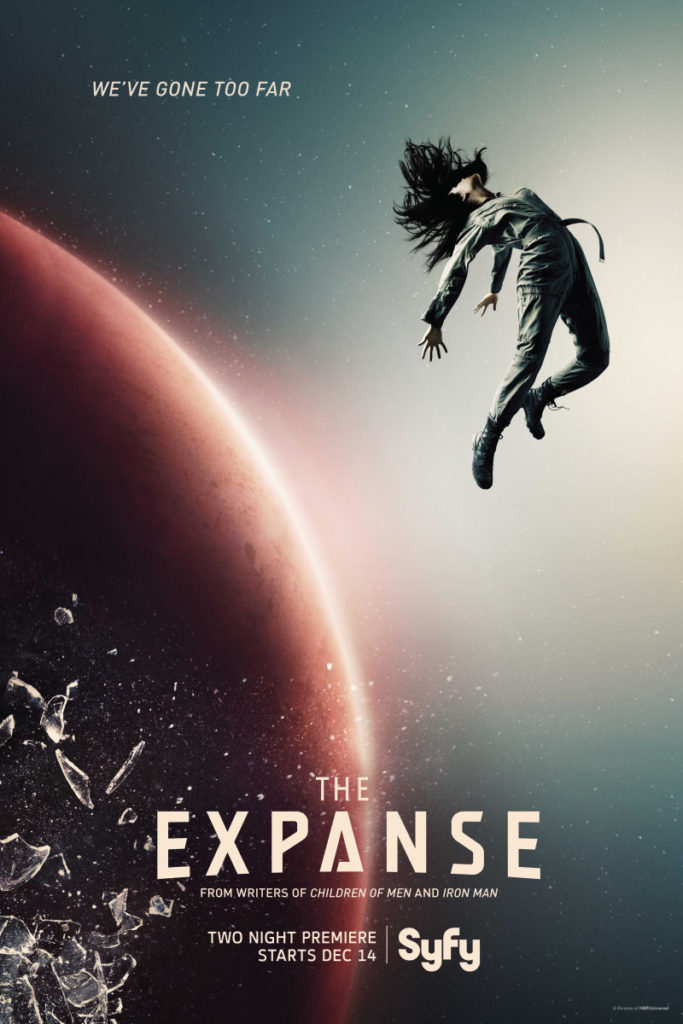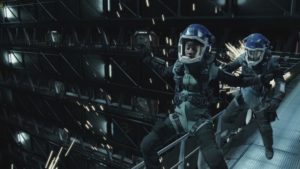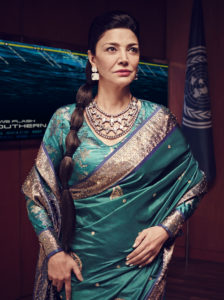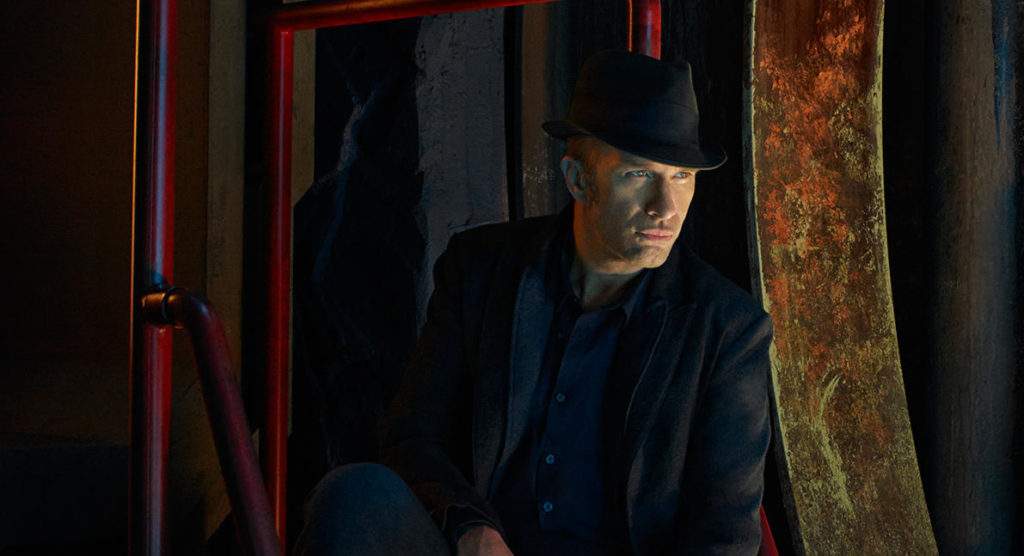 Imagine Earth, retaining walls surrounding the Statue of Liberty to fend off rising sea levels from effects global warming. The United Nations government is desperate for more resources to sustain a population so swollen you have to prove yourself worthy of more than Basic, the guaranteed subsidy that meets humanity’s baseline needs. Then you have independent Mars, boasting a small but brilliant population united behind one goal: creating a garden on a planet hostile to life. To prove they’re a major power in the solar system, they’ve developed a state of the art military that’s established a fragile peace with Earth. Caught between them is the Outer Belt, a collection of space stations and colonies scattered between Mars and Jupiter, populated by “Belters” who are under the yoke of Earth and Mars and loyal to neither. They’re unorganized, angry and desperate, and they’ve just been handed a reason to rebel.
Imagine Earth, retaining walls surrounding the Statue of Liberty to fend off rising sea levels from effects global warming. The United Nations government is desperate for more resources to sustain a population so swollen you have to prove yourself worthy of more than Basic, the guaranteed subsidy that meets humanity’s baseline needs. Then you have independent Mars, boasting a small but brilliant population united behind one goal: creating a garden on a planet hostile to life. To prove they’re a major power in the solar system, they’ve developed a state of the art military that’s established a fragile peace with Earth. Caught between them is the Outer Belt, a collection of space stations and colonies scattered between Mars and Jupiter, populated by “Belters” who are under the yoke of Earth and Mars and loyal to neither. They’re unorganized, angry and desperate, and they’ve just been handed a reason to rebel.
Sound intriguing? Welcome to The Expanse, adaptation of the bestselling book series by James S.A. Corey, a pen name for the writing team of Daniel Abraham and Ty Franck. On the heels of a critically acclaimed first season, season two is set to premiere tomorrow on SyFy. It’s been hailed as science fiction’s answer to Game of Thrones and the best sci-fi series since Battlestar Galactica. And if you’ve read the books, you know things are about to get really interesting.
Not enough to convince you to give it a shot? Here are 5 reasons why you should be watching:
- It puts the ‘science’ back in science fiction. As someone who cut her teeth on Star Trek and just took engagement photos with lightsabers, I’m as big a fan of soft sci fi as anyone. But the downside of soft sci fi is that while we get to see plenty of quirky aliens and strange new worlds, we forget about space. In The Expanse, water and air are precious cargo used as leverage to force cooperation. The poor struggling to scrape out a living amongst the stars aren’t just concerned with scraping together enough cash to put food on the table, but earning enough to afford air to breathe.
However the effects of living in a vacuum instead of down a gravity well aren’t restricted to political economics. They shine through in unexpected ways in varying scales. For instance Belters, by nature of growing up in zero-G, lack the bone density gained by exposure to gravity. This opens the door to gravity torture, where an individual is subjected to excruciating pain simply by being forced to exist in Earth’s gravity unassisted. Belters have also adopted to subtle but meaningful differences in body language, such as shrugging with their hands rather than their shoulders because it’s a more visible movement when you’re wearing a space suit. Space drives everything in The Expanse, with the show painstakingly following the examples set forth by the book’s authors, who were brought on by SyFy as writers and producers.
- It gets that science right. There are some excellent articles about The Expanse’s handling of gravity, but my favorite was one that broke down the physics the show employed when dealing with explosive decompression in the Season 1 episode “CQB.” In one of my favorite scenes from the novel, the characters have to problem solve sealing a hull breach caused by a round from a rail gun while locked in a room without suits and very few resources available. At the risk of spoiling a terrific scene I’ll say no more, except this particular moment drives home the dangers of space travel in spectacular fashion — and it does so using real science.

Space travel is another way the show stays true to the rules of physics. The ships in The Expanse aren’t sleek, aerodynamic marvels. They’re clunky, functional boxes designed for space, not air currents. And to take that one step further, they behave like ships in space. There is no speeding up and slowing down like a plane, or like the Enterprise. When the Canterbury responds to a distress call, the ship doesn’t point in a new direction while the crew stands calmly on deck and watches out the window. Instead, the show follows Newton’s First Law. Everyone straps into a crash couch, gets injected with the “juice” that will keep them conscious during high gee maneuvers and holds on while the ship flips over on its axis and burns the engine in the opposite direction. It’s not pretty, because space travel isn’t pretty. It’s hard. And watching it on screen is really cool.
- The political scene feels incredibly real. Earth, Mars and the Belt are three opposing forces with drastically different environments all competing for the same thing — resources. Earth, with a population of 30 billion, is taxed and desperate for more raw material. Belters have those raw materials in spades, but they don’t have basics like water and air. And then there’s Mars, united behind a single cause, creating life out of nothing on the red planet, while still facing a lot of the same fragilities as the Belt. Both Earth and Mars want the Belt, while the Belt wants independence. That’s a powder keg waiting to go off, and it does.
We see the personality of each faction in different ways. The overpopulation on Earth gives rise to family co-ops. Martian bitterness over Earth’s careless squandering of their precious resources. Rock haulers in the Belt coaxing every inch out of their failing equipment only to be driven to violence by the bullying of the inner planets. But nowhere is the conflict more visible than on Ceres, governed by Earth but sustained by Belters. The headquarters of Earth-based Star Helix, Ceres’ private police force, is located in the white, pristine parts of the station with green spaces and fountains, while scenes with Belters take place in the old, graffitied corridors where cheap air recyclers are substituted to cut costs, regardless of how it affects the populace.
-
Women and people of color are plentiful. While the core crew of the Rocinante are unfortunately the tried and true “three guys and a girl” dynamic, the sho
 w itself is rife with women and minorities. The most influential and cutthroat politician on Earth is an Indian woman (played by the phenomenal Shohreh Aghdashloo). The commander Mars’ military flagship is an Asian woman. The leader of the Outer Planets Alliance is a black man. Naomi Nagata (Dominique Tipper) of the Rocinante crew is a black woman Belter, and Alex Kamal is a Martian pilot with a southern drawl portrayed by Cas Anvar, who is of Persian, Indian, Lebanese and Latino descent. And that’s just the first season, adapted from Leviathan Wakes, the first novel in the series.
w itself is rife with women and minorities. The most influential and cutthroat politician on Earth is an Indian woman (played by the phenomenal Shohreh Aghdashloo). The commander Mars’ military flagship is an Asian woman. The leader of the Outer Planets Alliance is a black man. Naomi Nagata (Dominique Tipper) of the Rocinante crew is a black woman Belter, and Alex Kamal is a Martian pilot with a southern drawl portrayed by Cas Anvar, who is of Persian, Indian, Lebanese and Latino descent. And that’s just the first season, adapted from Leviathan Wakes, the first novel in the series.
The Expanse consistently strives to create a future that is decidedly not dominated by white men. It’s far from perfect, but still very refreshing. And that brings us to perhaps my favorite thing about The Expanse….
- Bobbie Draper. I want you to picture this. Imagine a 6’5” marine. This marine is 250 pounds of pure muscle, all trained to kick your ass while wearing power armor. Now throw in that this is a person of color. On its own that sounds pretty great, right? Now imagine that I’m talking about a woman. That’s right. Did you faint? Because it’s real. Bobbie Draper is the hero women both need and deserve, and waiting for you in season two’s premiere. Frankie Adams, a 6 foot tall actress and boxer of Samoan descent has been tapped to play the role, and it’s going to be amazing. See?
Nothing quite like The Expanse has been done before. The sky-high production values further heightened by compelling characters who run the gamut from powerful leaders to innocent bystanders to idealistic rebels and cynical dystopians who all feel very human and relatable. And if you’re familiar with the source material, the cast and crew have gone to great lengths to be both faithful to original while also improving on its shortcomings. Character development that we don’t see until book five is woven into the first season, showing a rather astute attention to detail that you don’t always see when fiction makes the leap to the screen. There’s a lot to love about this series, and I haven’t even mentioned Miller’s hat.

Photos from Syfy.com

Thank you for the callout to Miller’s hat. .>
My husband and I are really excited for season 2!! Neither of us have read the books, but Leviathan Wakes is on my Kindle…waiting…
I’ve got one episode left of season one, and plan on watching season two as it airs. As for the books, I’ve read the first three….. maybe four? books in the series, and the novellas up to that specific point. I’m dreadfully behind in that regard.